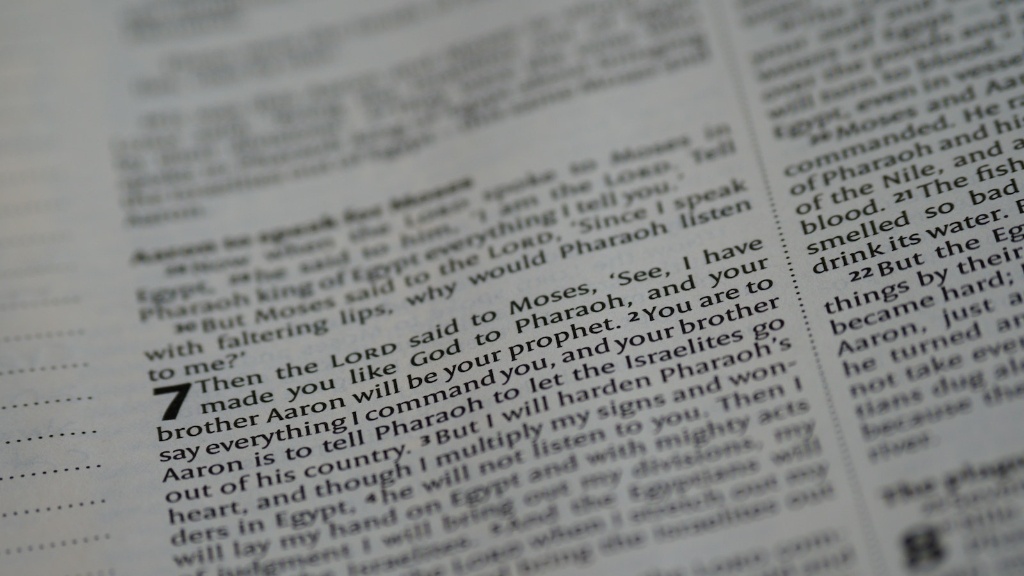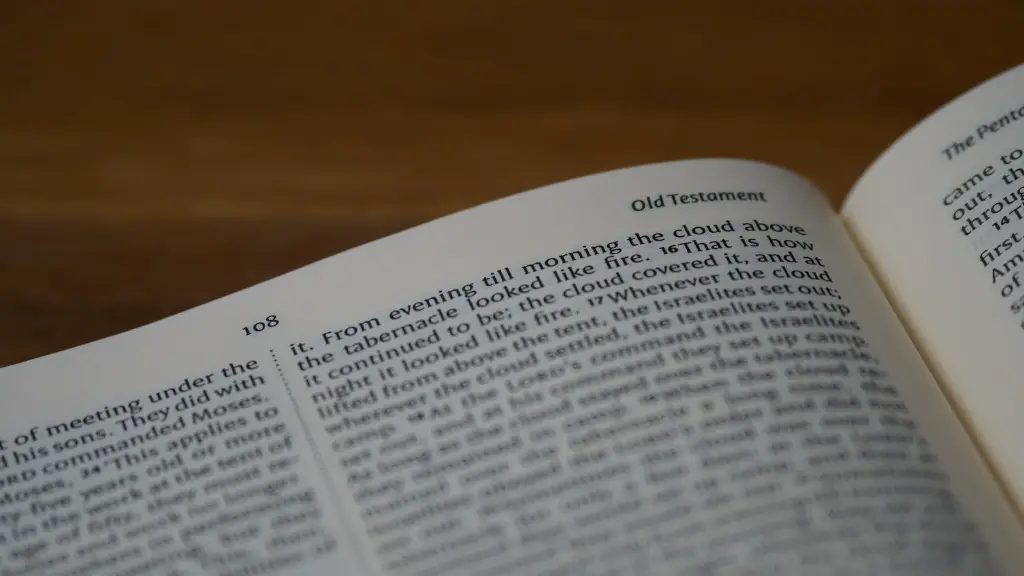The Bible has been a source of comfort, inspiration and guidance for many for centuries. Its words have shaped history, literature, and society at large. But is everything written in the Bible actually true?
It’s no secret that the Bible contains words of truth and wisdom, as well as stories, parables, and metaphors. Its teachings have been the source of much religious and spiritual enlightenment throughout history, but there have also been attempts to verify the accuracy of the Bible. Scholars and experts have searched for historical and archaeological evidence that could confirm various elements in the Bible.
One of the most famous examples is the case of the Hittites. The student of the Bible in the late 19th century could not find any mentions of this ancient people in any historical sources. Through archaeological research and excavations in the 20th century, however, the existence of the Hittites was confirmed.
There have been many other cases of archaeological findings that have provided evidence to back up certain biblical accounts. Take the story of Jericho, for instance. For a long time, it was believed that the city had been burned by the Israelites. But upon further investigation, it was found that Jericho had in fact been destroyed by an earthquake before the Israelites’ entrance.
Despite archaeological discoveries that lend credibility to many elements of the Bible, some scholars and experts maintain that the Bible is still full of inaccuracies. They point out that much of the Bible is based on oral traditions and may be subject to exaggeration and omission of truth. Furthermore, some challenges can be made from the standpoint of science; for example, the mention of a flat earth or of a six-day creation.
In addition, historians and archeologists have long sought evidence of the existence of certain historical people and places mentioned in the Bible, such as King Solomon and Nineveh. No physical proof has been found so far, although there are some who maintain that circumstantial evidence indicates that such places and people did exist.
Ultimately, how accurate the Bible is is a matter of opinion. Many hold that it is a faithful account of actual history, while others maintain that it contains some elements of truth, but also has many inaccuracies.
Verification Process
In recent years, the verification process of the Bible has improved to a great extent due to the advances in technology. Historians and experts have access to a wide range of data sources, ranging from archaeological findings to manuscripts and even computer databases. These resources are extensively utilized to verify facts and stories mentioned in the Bible.
For example, the Dead Sea Scrolls have provided many insights into the accuracy of the Bible. The scrolls are ancient manuscripts that have been preserved for centuries and whose contents have been compared to those of biblical manuscripts. The result is a verification of many of the stories and teachings of the Bible.
Similarly, the discovery of the Gilgamesh Epic has provided evidence of the accuracy of the Bible in certain aspects. The text states that after a great flood, a man named Noah was chosen by God to repopulate the earth with animals. These references can be seen in both the Bible and the Epic and hence lend credibility to both works.
The verification process also involves looking for references to characters and incidents in other historical records and sources. In some cases, such as the case of King David, the texts have been found to be consistent with the Bible. This is also the case with some of the events narrated in the Bible, such as the fall of Babylon.
Building Credibility
It is important to note that the verification process of the Bible is an ongoing process. While there is an abundance of archaeological and historical evidence that lend credibility to the Bible, there is still much to be done in the realm of scientific research and investigation.
In fact, many scholars are of the opinion that the more we learn about the Bible and its historical context, the more accurate and reliable our understanding of it becomes. This is why there is an ongoing effort to search and analyze ancient manuscripts, archaeological findings and other sources of information in order to build credibility for the Bible.
In addition, much research is being conducted to uncover the authorship of various biblical books and the true underlying meaning of many key messages and teachings. In this way, experts aim at creating a more reliable and detailed understanding of the Bible.
So, while it is impossible to state with absolute certainty that everything written in the Bible is true, it is clear that it contains a wealth of valuable information and wisdom that has been verified many times over.
Modern Interpretations
In recent years, scholars and theologians have been exploring the possibility of new interpretations of the Bible. Much of this research is focusing on how the Bible has been and is currently interpreted in light of modern values and beliefs.
For example, certain passages in the Bible can be viewed differently in a modern context, such as the teachings of Jesus on forgiveness and love, which were often interpreted to mean certain behaviors in the past, but can now be seen in a more nuanced and progressive way.
In addition, researchers are also exploring how cultural and historical contexts have influenced the interpretation of various passages in the Bible. This has led to a deeper understanding of the Bible and its meaning, and an appreciation of the nuances contained in its teachings.
Finally, there has been an emphasis on exploring what the Bible has to do with scientific discoveries and theories. While the Bible does contain references to a flat earth, for example, modern research can provide additional perspective on the true meaning and significance of such passages.
Bible Criticism
While there is much to be learnt from exploring the accuracy of the Bible and its interpretation, some scholars and theologians believe that too much emphasis placed on accuracy can be damaging. According to their view, the Bible should be evaluated in light of the values and beliefs at the time it was written.
Some critics also point out that the Bible is a work of literature and should not be taken too literally. They argue that it is important to understand the context of its writings instead of focusing exclusively on its accuracy.
In addition, some critics believe that accuracy should not be the only criteria for evaluating the Bible. Instead, they suggest that the Bible should be judged on its moral and spiritual content. According to this view, the Bible should be seen as a source of moral and spiritual guidance, rather than as a historical document.
Finally, some theologians and scholars reject the notion of using accuracy to evaluate the Bible. They argue that the truth contained in the Bible lies in its spiritual message, rather than in a literal or historical understanding.
Biblical Inerrancy
Despite the various criticisms of the Bible and its accuracy, many still maintain that it is an inspired work of literature and should be read as such. This idea is known as biblical inerrancy, which is the belief that the Bible is completely accurate and free from errors and contradictions.
Those who subscribe to this belief point out that the Bible was written by numerous authors and compiled over a long period of time, making it impossible for its accuracy to be completely verified. They further maintain that, despite the various ways in which the Bible has been misinterpreted throughout history, its core teachings are still true and unchanged.
It is important to note that, regardless of one’s views on the accuracy of the Bible, it is universally recognized for its moral and spiritual wisdom. Thus, many seek the Bible for guidance and understanding, and its truth is found in its teachings.
Purpose of the Bible
For many, the purpose of the Bible is not to prove its accuracy, but to explore the timeless teachings and treasures contained within it. This is why it is important to approach the Bible with an open mind and heart and to recognize its potential for inspiring wisdom and clarity.
The Bible can be read not only as a source of spiritual guidance, but also as a source of inspiration and wisdom for modern life. Through its exploration and contemplation, readers are able to bridge the gap between ancient and contemporary beliefs and discover deeper and more meaningful truths.
Understanding and appreciating the Bible lie at the heart of its truth. It is the power of its stories, teachings and messages that make it an invaluable source of guidance and inspiration.





